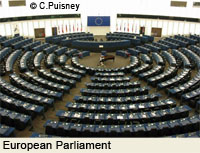European Parliament debates FP7
The European Parliament expressed broad support for the EU's proposed Seventh Framework Programme for Research and Development (FP7) at its plenary meeting in Strasbourg on 13 June. Speaking at the start of the debate, Science and Research Commissioner Janez Potocnik said that two-thirds of the amendments to the Commission's proposal put forward by MEPs could easily be accepted by the Commission. Of the remaining third, he said many were too detailed or fell outside of the remit of the research and technology dossier. On the European Research Council, Mr Potocnik stated that to have a review in 2008, after just one year of operation, would not be very meaningful. He suggested that a full review should instead be carried out so that the future structure of the ERC could be decided before 2010. Unsurprisingly, stem cell research was a hotly debated topic. Commissioner Potocnik said that while he had 'profound respect' for every personal opinion, the Commission's ideas were in line with those of the Parliament's Industry, Research and Energy (ITRE) Committee. At the end of May, the ITRE Committee had said that while embryos should not be produced solely for stem cell research, FP7 money could be used to fund stem cell research in countries where the legal system permitted it, and in the framework of strict licensing conditions. Polish MEP Jerzy Buzek, the rapporteur for the FP7 proposal, said that he had tried to reach a compromise that would get majority support. However, there remains a large group of MEPs who are strongly opposed to stem cell research. Energy research was also high on the agenda, with a number of groups saying that more money should be given to sustainable energy resources. Earlier this week, the European Renewable Energy Centres Agency (EUREC) wrote to MEPs asking them to support amendments to the FP7 text which would see two thirds of the budget for non-nuclear energy research go towards renewable energy and energy efficiency. One of the amendments cited by EUREC was put forward by Philippe Busquin, the former EU Research Commissioner. EUREC, the European Renewable Energy Centres Agency is also concerned that unlike FP6, FP7 includes a budget line for 'clean coal' research. Clean coal research already benefits from the remnants of the Research Fund for Coal and Steel, which was set up under the now expired European Coal and Steel Community (ECSC) treaty. EUREC believes that coal research should be funded by the interest (which is worth EUR 16 million) on the EUR 1.6 billion in assets left behind by the ECSC. FP7 should focus instead on research which will contribute to a sustainable, secure European energy sector. The representatives of the Parliament's political groups outlined their main views on the framework programme. The EPP-ED (European People's Party and European Democrats) Group stressed the importance of disease prevention and improving employment and jobs, while the Party of European Socialists underlined the importance of the ERC, and expressed regret that the budget for linking science and society had been cut by the Council. The Alliance of Liberals and Democrats for Europe (ALDE) also emphasised the importance of linking science and society, including educating the public on analysing and managing risk. They added that if Europe wanted to compete on the world stage, it was essential to create scientific links to industry and small and medium sized enterprises (SMEs). The Green Party commented that industrial research had been given too large a priority, and stressed the importance of renewable energy research which, in its view, had not received enough support. There was widespread agreement across the parties that the budget for the research programme was lower than it should be. The Commission had originally proposed a budget of around EUR 72 billion, but this had been cut to EUR 54.5 billion when the overall EU budget was amended. Speaking at the end of the debate, Mr Buzek described the reduced budget as a 'missed opportunity'. The MEPs will vote on the proposal on Thursday 15 June.



